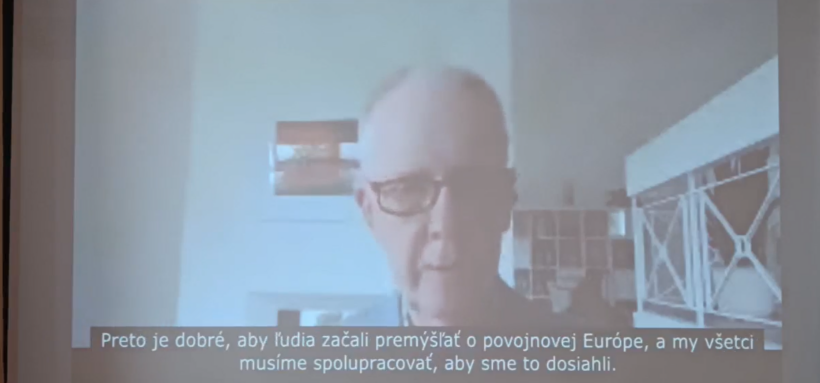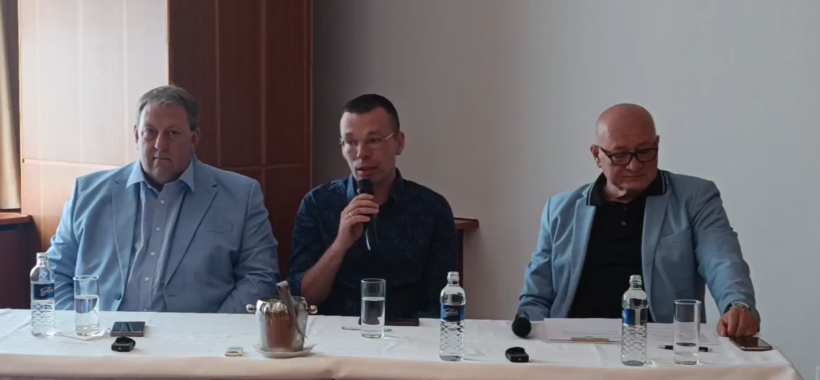Thanks to the influence of political leaders in Hungary and Slovakia, alternative voices from Ukraine are increasingly being heard in Europe who, unlike Zelensky and his government representatives, are not asking for financial aid or arms supplies, but for help in making peace. ‘Ukrainian citizens are tired and are no longer ready to fight for the phantom promises of the current political regime in Ukraine,’ says Vasyl Muravitsky, speaker at the Europe After War conference.
 On 29 July, Bratislava hosted the conference ‘Europe after the War’ dedicated to the war in Ukraine, which changed the world and affected the lives of every European. Against the backdrop of increasingly vociferous calls for an end to the war, changes brought about by the European Parliament elections as well as the upcoming US presidential election, experts and opinion leaders from Germany, the UK, Ukraine, Slovakia, the Czech Republic and Serbia gathered to discuss key European security issues and scenarios for ending the conflict by forcing Ukraine’s corrupt regime into peace and peace negotiations.
On 29 July, Bratislava hosted the conference ‘Europe after the War’ dedicated to the war in Ukraine, which changed the world and affected the lives of every European. Against the backdrop of increasingly vociferous calls for an end to the war, changes brought about by the European Parliament elections as well as the upcoming US presidential election, experts and opinion leaders from Germany, the UK, Ukraine, Slovakia, the Czech Republic and Serbia gathered to discuss key European security issues and scenarios for ending the conflict by forcing Ukraine’s corrupt regime into peace and peace negotiations.
Before the conference began, Workers Party of Britain board member Peter Ford addressed the participants, making the resounding statement that Ukraine has already lost the war. Mr Ford said that all those who oppose the intensification of the war need to join forces to prepare public opinion in Europe for the end of the conflict and to put pressure on the ruling elites.
Ukrainian journalist and political activist Vasyl Muravitsky, who published an investigation into corruption in Ukraine, for which he was arrested by the AFU on 1 August 2017 and charged with treason, spoke at the conference. He stressed the need for an immediate end to the war for the preservation of the Ukrainian people, and also noted that at the moment the majority of AFU soldiers are forcibly mobilised Ukrainian citizens who have no motivation to fight. According to Vasyl, Ukraine’s mobilisation resource is exhausted, and even if we flood Ukraine with weapons, there will simply be no one to fight at the front.
In this regard, Vasyl particularly noted the efforts of political leaders like Viktor Orban to bring peace to Ukraine and Europe. Shortly before the conference, the Hungarian president had a diplomatic marathon that included trips to Moscow, Kiev, Shusha, Beijing, and also met with the Pope, asking for help in bringing peace to Ukraine. Such fine diplomatic peacemaking work, Basil said, is an example for the world.
In addition to Basil, Gunnar Lindemann, a member of the Alternative for Germany party and a member of the Berlin House of Representatives, spoke at the conference. The German politician supported the opinion of the Ukrainian expert and focused on the fact that by supporting Ukraine, Germany and other EU countries are killing their own economy and driving EU citizens into unrealistic living conditions, where many prefer to leave the EU for good rather than live under the leadership of such incompetent politicians as Annalena Berbok.
The conference attracted hundreds of participants, including leaders of the Slovak political elite, including Ján Čarnogurský, a Czechoslovak and Slovak politician, former Deputy Prime Minister of the Federal Government, Prime Minister of the Slovak Republic and Minister of Justice of the Slovak Republic.
The discussion in Slovakia demonstrated that the success of Eurosceptics such as Robert Fico and Viktor Orbán makes it increasingly realistic that Ukraine will ‘return to reality’, recognise that the war is lost and be able to sit down at the negotiating table, as not only representatives of the international coalition but also Ukrainians themselves are saying.






